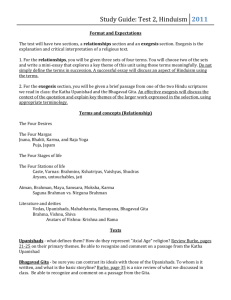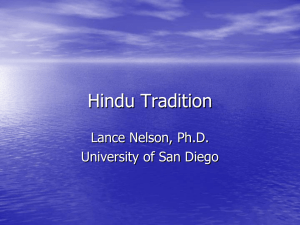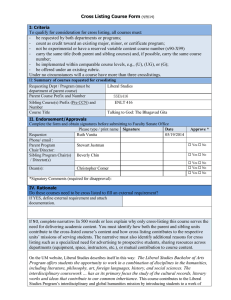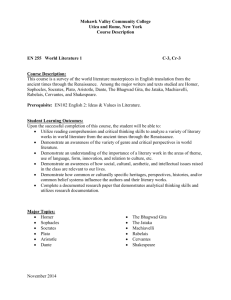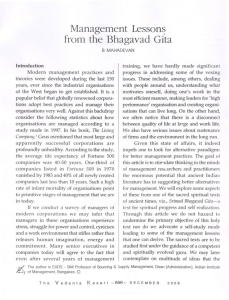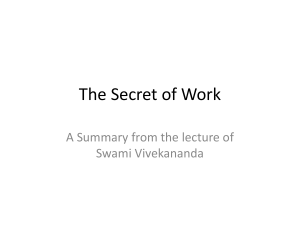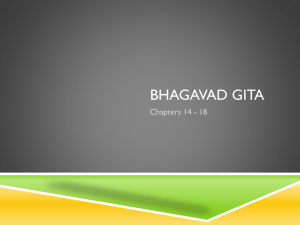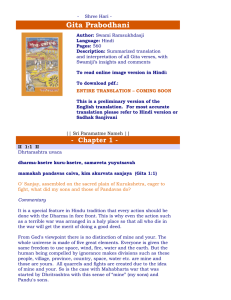Syllabus
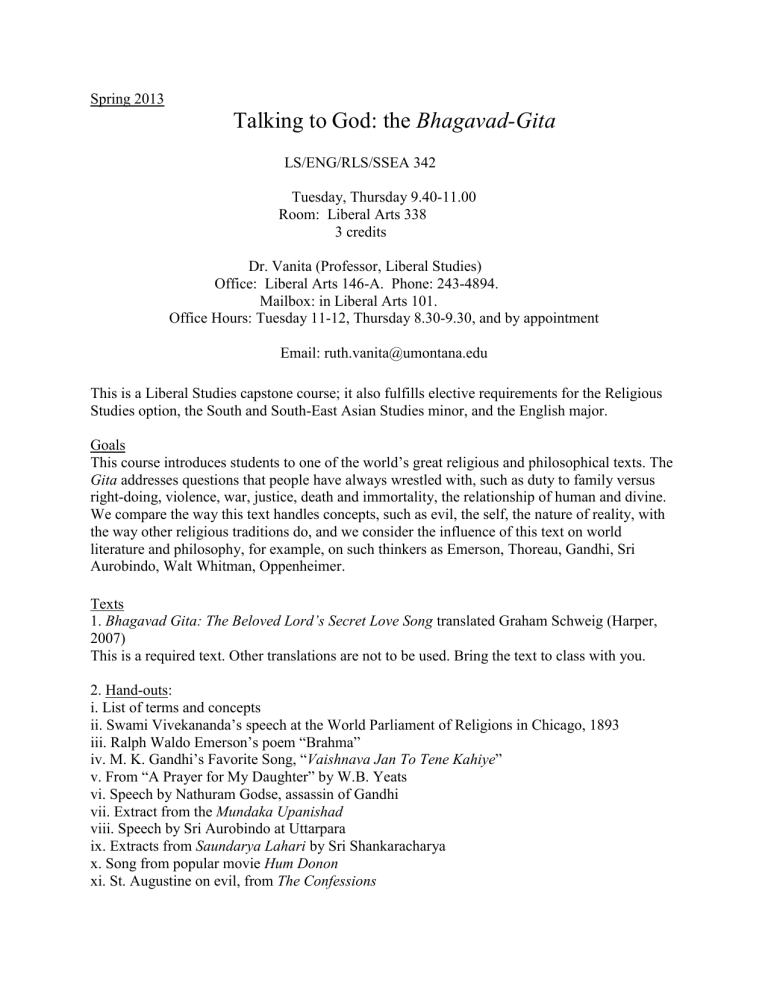
Spring 2013
Talking to God: the Bhagavad-Gita
LS/ENG/RLS/SSEA 342
Tuesday, Thursday 9.40-11.00
Room: Liberal Arts 338
3 credits
Dr. Vanita (Professor, Liberal Studies)
Office: Liberal Arts 146-A. Phone: 243-4894.
Mailbox: in Liberal Arts 101.
Office Hours: Tuesday 11-12, Thursday 8.30-9.30, and by appointment
Email: ruth.vanita@umontana.edu
This is a Liberal Studies capstone course; it also fulfills elective requirements for the Religious
Studies option, the South and South-East Asian Studies minor, and the English major.
Goals
This course introduces students to one of the world’s great religious and philosophical texts. The
Gita addresses questions that people have always wrestled with, such as duty to family versus right-doing, violence, war, justice, death and immortality, the relationship of human and divine.
We compare the way this text handles concepts, such as evil, the self, the nature of reality, with the way other religious traditions do, and we consider the influence of this text on world literature and philosophy, for example, on such thinkers as Emerson, Thoreau, Gandhi, Sri
Aurobindo, Walt Whitman, Oppenheimer.
Texts
1. Bhagavad Gita: The Beloved Lord’s Secret Love Song translated Graham Schweig (Harper,
2007)
This is a required text. Other translations are not to be used. Bring the text to class with you.
2. Hand-outs: i. List of terms and concepts ii. Swami Vivekananda’s speech at the World Parliament of Religions in Chicago, 1893 iii. Ralph Waldo Emerson’s poem “Brahma” iv. M. K. Gandhi’s Favorite Song, “
Vaishnava Jan To Tene Kahiye
” v. From “A Prayer for My Daughter” by W.B. Yeats vi. Speech by Nathuram Godse, assassin of Gandhi vii. Extract from the Mundaka Upanishad viii. Speech by Sri Aurobindo at Uttarpara ix. Extracts from Saundarya Lahari by Sri Shankaracharya x. Song from popular movie Hum Donon xi. St. Augustine on evil, from The Confessions
xii. “ Kurai Ondrum Illai
,” Tamil Hymn to Sri Krishna
Requirements
Students are required to
(a) attend classes regularly. As the text is a difficult one, this is very important. Please inform me in advance if you are unable to attend a class. More than three absences not explained to my satisfaction will result in halving your grade for attendance and class participation, and five or more absences will result in a zero for attendance; leaving early or coming late without explanation will be treated as an absence.
(b) hand in a thoughtful typed question or comment at the end of every class on the text that is to be discussed in class that day. Handwritten questions will not receive credit.
Attendance may sometimes be given on the basis of these questions. If you are ever unable to hand in a question, it is your responsibility to tell me this and to have yourself marked present.
(c) keep up with the assigned reading, bring the texts to class, and participate in class discussions.
(d) Complete quizzes and other assignments, and take the mid-term and final exams
(e) write a paper. Topics will be given in advance.
(f) Check UM email regularly , especially the day before class. I send out notifications and changes by email. UM policy forbids me to write to you on any email address other than the UM one. The best way to communicate with me is by email.
Grades
Class attendance and participation will be worth 25%, quizzes 20%, the mid-term and the final exams 20% each, the paper 15%. Late papers will not be accepted.
Opportunities for extra credit: 2 points for attending the presidential lecture on Gandhi by Leela
Gandhi on March 4, and writing a one-page response to it (to be given to me in class on March
5); 1 point for attending the Indian classical music performance by Aditya Prakash on the evening of March 9.
Quizzes on the texts and on information provided in class may be given according to schedule or unexpectedly. Quizzes can be made up within the week (not more than twice in the semester), but not later. To make up a quiz, speak to me after class or email me to make an appointment.
Plagiarism or academic dishonesty of any kind, in any assignment, will result in your failing the class and may also result in other penalties such as expulsion from the
University (for further details, refer to the section on Academic Misconduct in the Student
Conduct Code).
If you have any condition, such as a physical or learning disability, that will make it difficult for you to complete the work as I have outlined it, please notify me in the first week of class.
Reading Schedule
This schedule is tentative. It is your responsibility to keep up with any changes and obtain any hand-outs given in class on any day that you are absent. Readings listed for a particular
day are to be read before coming to class on that day, e.g. come to class on February 12, having read Chapter 1 of the Gita .
January 29 Explanation of syllabus, and introduction to the course.
January 31 Background: Hindu doctrine and practice.
February 5 Read Swami Vivekananda’s speech and “From the Mundaka Upanishad
”.
Background: Hindu philosophy; Vedas & Upanishads; approaches to the Gita ; this translation.
February 7 Read the list of terms and concepts. Background: the Mahabharata . Read Note on
the Mahabharata .
February 12 Quiz on background. Read Gita , Chapter 1.
February 14 Read Gita , pp. 35-45 and Emerson’s poem, “Brahma.”
February 19 Read Gita , pp. 46-56 and “M. K. Gandhi’s Favorite Song.”
February 21 Read Gita
, Chapter 3, and “From ‘A Prayer for My Daughter’ by Yeats”
February 26 Read Gita , Chapter 4 and Speech by Nathuram Godse. Quiz on Chapters 1-3.
February 28 Read Gita , Chapter 5
March 5 Read Gita , Chapter 6.
March 7 Read Gita , Chapter 7. Quiz on Chapters 4-7.
March 12 Read Gita , Chapter 8 and Vivekananda’s letter written shortly before his death.
March 14 Review
March 19 Mid-term exam
March 21 Read Gita
, Chapter 9 and Extracts from Sri Aurobindo’s speech at Uttarpara.
March 26 Read Gita , Chapter 10, “Extracts from Saundarya Lahari,
”
March 28 Read Gita , pp. 150-160.
Spring Break April 1-5
April 9 Read Gita , pp. 160-68. Quiz on Chapters 1-11.
April 11 Read Gita , Chapter 12.
April 16 Read Gita , Chapter 13.
April 18 Read Gita
, Chapter 14 and “Song from popular movie
Hum Donon
”
April 23 Read Gita , Chapter 15.
April 25 Read Gita
, Chapter 16 and “St. Augustine on evil, from
The Confessions
”
Quiz on
chapters 12-15
April 30 Read Gita , Chapter 17 Quiz on Chapters 1-16.
May 2 Read Gita , pp.219-232
May 7 Read Gita , pp. 233-42, Tamil hymn to Sri Krishna, Sri Aurobindo on Chapter 18
.
May 9 Quiz on Chapters 17-18. Paper due in class .
Final Examination Monday, May 13, 8.00- 10.00 a.m.

